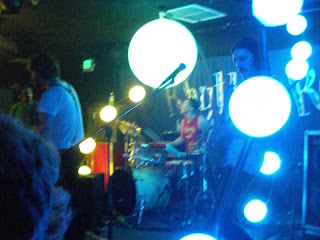With less than a month to go, all the hype over Barack Obama’s inauguration—and Bush’s retirement—is about to boil over.
Curt “1.20.09” buttons and t-shirts—the day Bush leaves office—have populated hipster bookstores and independent coffee shops for over four years. I don’t remember as much anxious anticipation when Clinton faced impeachment, either an indication of how much worse things are this time around or a sign that republicans lack the ability to make trendy accessories.
But anyway, as the date draws nearer, I have to ask myself, why am I not more excited?
I should be. This is what we’ve all been struggling toward. Every time Pres. Bush or one of his ilk make John Stewart’s day with an fourth-grade lingual gaffe or example of social incompetence, I adopt the same reaction as my peers—eyes rolled, hand on forehead, make a “pishhh” sound with mouth before expressing utter disbelief that a man elected president could behave this way. I, like nearly 80% of American, desperately need Obama to hurry into office.
However, my apathy for Obama’s takeover becomes more apparent to me every time I go out with my girlfriend. She (and her mom) are obsessed with Obama, to the point of yelling and cheering whenever they see a TV news segment or an Obama bumper sticker. In contrast to their, at times overwhelming, enthusiasm, I feel like a party pooper.
I guess I’m just still skeptical. I know that a president—excellent figurehead and scapegoat that he is—never works alone. Obama’s appointments hold as much political significance as his election, though they have received much less hype. Some choices worry me a little, such as Hillary Clinton and retaining Robert Gates.
There’s also a lingering distrust over the reality of Obama—Obama the man not Obama the idea. His orations inspired so much hope, but will his actions?
An article in New York Magazine by John Heilemann (http://nymag.com/news/politics/powergrid/53165/) titled “Bush and Barack, Bedfellows” summed up my feelings well:
“That all this has come as such a shock to so many owes to a misreading of Obama as a starry-eyed idealist—when there was ample evidence that lurking just beneath the surface was a hard-eyed, sometimes hawkish realist,” writes Heilemann.
This isn’t a pessimistic criticism of Obama so much as a reminder that Obama, like any president, is a politician. All the idealism aside, the hard realities of our economic situation, war, energy crisis, etc., and the constant game of political positioning and posturing still apply. It gets in the way of all that raw optimism I so desperately want to feel.
Obama’s election marked a monumental point in American history, what could be the highest point in this century’s zeitgeist, and a defining bulletin for our generation. Not since the post-Nixon wave of political disillusionment that dug a sharp precipice between politicians and the American people have people displayed such widespread optimism. “Change,” to me, stood for hope, hope in a future people could believe in and support instead of rolling eyes and enduring on the motto: “he’ll be out of office soon.”
For the sake of my mental health, I’m going to make an effort to forget all the negative for a while; just let it all go. Obama is a politician, but he’s a new kind of politician, a unifying, hopeful politician—for better or worse. That, at least, is something worth getting excited about.












































